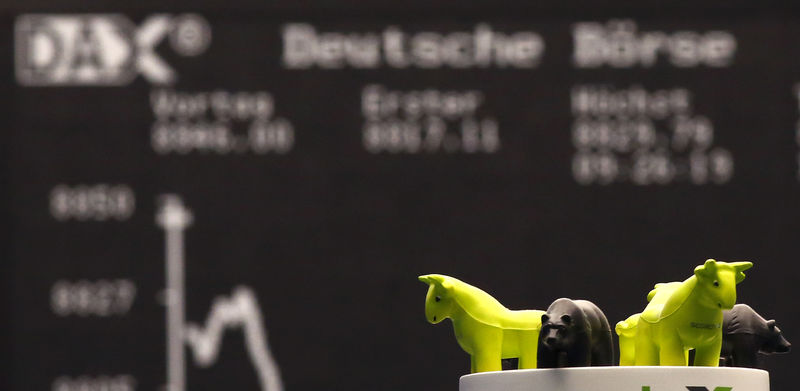Investing.com - European stock markets edged largely lower Tuesday, as investors digested weak German industrial output data as well as more quarterly corporate earnings.
At 03:45 ET (09:00 GMT), the DAX index in Germany traded 0.1% lower, the CAC 40 in France traded 0.2% lower, while the FTSE 100 in the U.K. traded flat.
German industrial production contracts sharply
German industrial production fell more than expected in September, falling by 1.4% compared with the previous month, offering up more evidence of the weak economic conditions in Europe.
This disappointing data suggests that the country's third-quarter GDP growth could be revised downwards, and is likely to increase pressure on the European Central Bank to loosen its monetary policies.
Eurozone September producer prices are scheduled for release later in the session, and are expected to rise 0.5% on the month, a 12.5% drop on an annual basis.
Chinese trade data disappoints
European equities had received a negative handover from Asia earlier in the session after data highlighted continued headwinds for the Chinese economy, the second largest in the world.
Chinese exports slid 6.4% year-on-year in October, accelerating from a 6.2% drop in the prior month, while the country’s trade surplus fell to its worst level since May 2022, at the height of the COVID-19 pandemic.
The drop in exports signaled worsening overseas demand, particularly from China’s biggest trade destinations - Europe and the U.S..
Adding to the negative sentiment, the Reserve Bank of Australia hiked interest rates earlier Tuesday, citing a slower-than-expected decline in inflation.
UBS reports hefty quarterly loss
In corporate news, UBS (SIX:UBSG) stock rose 4.2% after the banking giant signaled that its core wealth business is stabilising even after posting a $785 million loss in the third quarter. That followed the Swiss lender booking $2.1 billion in expenses tied to its rival Credit Suisse (SIX:CSGN).
Direct Line (LON:DLGD) stock rose 4.7% after the insurance group reported a strong performance in the third quarter, helped by healthy growth in its motor division.
Associated British Foods (LON:ABF) stock rose 6.1% after the owner of fast fashion retailer Primark announced a fresh share buyback and a bumper dividend after reporting double-digit growth in revenue and profit.
Watches Of Switzerland (LON:WOSG) stock soared 6.8% as the luxury retailer expects to more than double its annual profit by 2028.
On the flip side, Capgemini (EPA:CAPP) stock fell 0.3% after the French IT consulting group posted a 1.3% fall in third quarter revenue, as conditions remained “challenging" and with revenues declining in the North American region.
Crude slips after weak Chinese trade data
Oil prices fell Tuesday after the disappointing trade data from China raised concerns over sluggish demand in the world's largest oil importer.
Chinese exports fell more than expected in October amid worsening overseas demand, while an unexpected rise in imports saw China’s trade surplus shrink to its worst level in 17 months.
This prolonged weakness in exports could stymie growth in the country going forward and thus dent oil demand.
By 09:00 ET, the U.S. crude futures traded 1.9% lower at $79.31 a barrel, while the Brent contract dropped 1.8% to $83.66 a barrel.
Both contracts were nursing steep losses over the past week, amid growing expectation that the Israel-Hamas war will not disrupt supply in this oil-rich region.
Additionally, gold futures fell 0.8% to $1,972.80/oz, while EUR/USD traded 0.1% lower at 1.0703.
